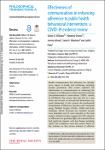Effectiveness of communications in enhancing adherence to public health behavioural interventions: a COVID-19 evidence review
| dc.contributor.author | Williams, SN | |
| dc.contributor.author | Dienes, K | |
| dc.contributor.author | Jaheed, J | |
| dc.contributor.author | Wardman, JK | |
| dc.contributor.author | Petts, J | |
| dc.date.accessioned | 2023-09-11T11:03:30Z | |
| dc.date.available | 2023-09-11T11:03:30Z | |
| dc.date.issued | 2023-10-09 | |
| dc.identifier.issn | 1471-2962 | |
| dc.identifier.issn | 1471-2962 | |
| dc.identifier.other | ARTN 20230129 | |
| dc.identifier.uri | https://pearl.plymouth.ac.uk/handle/10026.1/21305 | |
| dc.description.abstract |
<jats:p>Health communication has relevance for virtually every aspect of health and well-being, including disease prevention. This review explored the effectiveness of communications in enhancing the adoption of or adherence to behavioural interventions (non-pharmaceutical interventions (NPIs)) related to COVID-19. The review takes the UK as a case study and focuses on self-reported behaviours (e.g. social distancing). It also reviews the psychosocial determinants of adherence. Searches were conducted using PubMed, Scopus, CINAL, ASSIA and iCite databases. Eleven thousand five hundred records were identified and 13 were included in the final sample. Included studies suggest that NPI adoption or adherence was generally high, and communication had significant impacts, with key themes including clarity and consistency, trust and control. Based on the evidence in this review, features of effective communication in the context of NPI adoption or adherence are (i) information should be conveyed clearly and conflicting (mixed) messages should be avoided; (ii) information should be conveyed by trusted sources (e.g. health authorities) and (iii) communication should strike a balance between being authoritative but avoiding language seen as controlling (e.g. ‘you must’). Future research should prioritize quantitative, experimental and longitudinal study designs, that focus specifically on communication as an intervention, and which measure behaviour.</jats:p> <jats:p>This article is part of the theme issue 'The effectiveness of non-pharmaceutical interventions on the COVID-19 pandemic: the evidence'.</jats:p> | |
| dc.format.extent | 20230129- | |
| dc.format.medium | Print-Electronic | |
| dc.language | en | |
| dc.publisher | The Royal Society | |
| dc.subject | COVID-19 | |
| dc.subject | health communication | |
| dc.subject | non-pharmaceutical interventions | |
| dc.subject | behavioural interventions | |
| dc.subject | adherence | |
| dc.title | Effectiveness of communications in enhancing adherence to public health behavioural interventions: a COVID-19 evidence review | |
| dc.type | journal-article | |
| dc.type | Review | |
| plymouth.author-url | https://www.ncbi.nlm.nih.gov/pubmed/37611630 | |
| plymouth.issue | 2257 | |
| plymouth.volume | 381 | |
| plymouth.publication-status | Published | |
| plymouth.journal | Philosophical Transactions of the Royal Society A: Mathematical, Physical and Engineering Sciences | |
| dc.identifier.doi | 10.1098/rsta.2023.0129 | |
| plymouth.organisational-group | |Plymouth | |
| plymouth.organisational-group | |Plymouth|PS - Office of Vice Chancellor | |
| plymouth.organisational-group | |Plymouth|Users by role | |
| plymouth.organisational-group | |Plymouth|Users by role|Academics | |
| dc.publisher.place | England | |
| dcterms.dateAccepted | 2023-05-23 | |
| dc.date.updated | 2023-09-11T11:03:25Z | |
| dc.rights.embargodate | 2023-9-12 | |
| dc.identifier.eissn | 1471-2962 | |
| rioxxterms.versionofrecord | 10.1098/rsta.2023.0129 |


